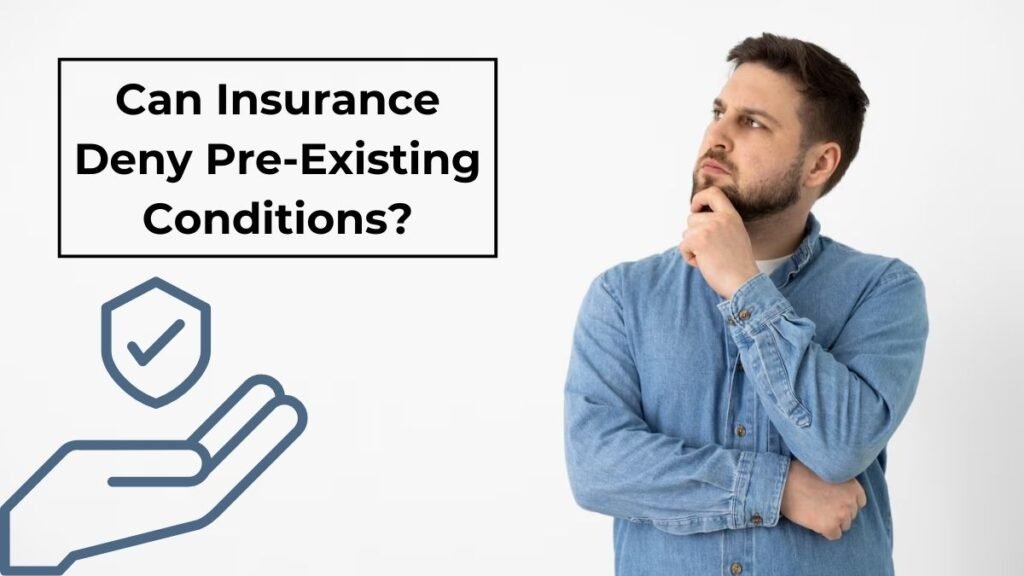Navigating the world of insurance can feel like a maze, especially when you’re dealing with health concerns that predate your coverage. The question “Can insurance deny pre-existing conditions?” is one that weighs heavily on many minds—whether you’re a small business owner seeking family health coverage or an individual worried about rising medical costs. Understanding how insurers handle pre-existing conditions is key to securing the protection you need without facing unexpected denials or sky-high premiums.
In this in-depth guide, we’ll explore what pre-existing conditions mean in the insurance landscape, how regulations and policy types affect coverage, and what you can do if you’re facing a denial. Whether you’re insuring yourself or your loved ones, this article will empower you with the knowledge to tackle this complex issue.
What Are Pre-Existing Conditions?
A pre-existing condition is any health issue—diagnosed or undiagnosed—that you had before applying for or enrolling in an insurance policy. Examples range from chronic illnesses like diabetes or asthma to past injuries like a broken leg, or even conditions you’re managing without a formal diagnosis, like high blood pressure. Insurers use this term to assess your risk level, which can influence their decision to cover you, set your premiums, or impose restrictions.
Historically, pre-existing conditions were a major hurdle in securing health insurance. Before modern regulations, insurers could deny coverage outright or charge exorbitant rates based on your medical history. Today, the rules have shifted, but the details depend on the type of insurance you’re seeking—health, life, disability, or otherwise.
How Health Insurance Handles Pre-Existing Conditions
In the U.S., the Affordable Care Act (ACA) transformed how health insurance deals with pre-existing conditions. Here’s the breakdown:
- ACA Marketplace Plans: Since 2014, these plans cannot deny coverage or charge higher premiums based on pre-existing conditions. If you buy through HealthCare.gov or a state exchange, your diabetes or heart disease won’t block you from enrolling.
- Employer-Sponsored Plans: Most group plans follow similar rules under the ACA and HIPAA, ensuring coverage regardless of health history, as long as you enroll during open enrollment or a qualifying event.
- Short-Term Health Plans: These aren’t ACA-compliant and can deny you or exclude pre-existing conditions. They’re cheaper but riskier—fine for a gap, not a long-term fix.
- Medicaid and Medicare: Both government programs cover pre-existing conditions fully, with eligibility based on income, age, or disability—not health status.
The catch? You must apply during designated periods (e.g., open enrollment, November 1 to January 15) or after a life event (e.g., job loss) to avoid gaps where pre-existing conditions could complicate coverage.
Pre-Existing Conditions in Other Insurance Types
Beyond health insurance, pre-existing conditions can still trip you up:
- Life Insurance: Insurers often ask about your health history. A condition like cancer might lead to higher premiums, exclusions (e.g., no payout if you die from that illness within two years), or outright denial—especially with private, individual policies.
- Disability Insurance: Pre-existing conditions can be excluded for 12-24 months or increase rates. If you’ve got a chronic back issue, a new policy might not cover related claims right away.
- Auto and Home Insurance: These don’t typically consider health, but your driving record or home’s condition (e.g., past damage) can act like “pre-existing” factors affecting rates or approval.
Each type has its own rules—health insurance is the most regulated, while life and disability lean harder on underwriting.
What If You’re Denied Coverage?
Facing a denial doesn’t mean you’re out of options. Here’s what to do:
- Appeal the Decision: Insurers must explain denials—review their reasoning, gather medical records or doctor letters, and challenge inaccuracies.
- Explore ACA Plans: If private health insurance denies you, marketplace plans guarantee coverage during enrollment windows.
- Check State Programs: High-risk pools or state-specific plans (pre-ACA holdovers in some areas) can step in for tough cases.
- Adjust Policy Type: For life or disability, a guaranteed-issue policy (no health questions) might work, though it’s pricier and offers less coverage.
- Consult a Broker: An expert can navigate exclusions or find insurers more lenient with your condition.
Persistence pays off—denials aren’t always final.
Comparison Table: Insurance Types and Pre-Existing Conditions
Here’s a table to compare how pre-existing conditions impact different insurance types:
| Insurance Type | Can Deny Coverage? | Premium Impact | Exclusions Possible? | Key Regulation |
|---|---|---|---|---|
| ACA Health | No | No | No | Affordable Care Act |
| Life | Yes | Yes, often higher | Yes | State laws, underwriting |
| Disability | Yes | Yes, varies | Yes, often 12-24 mo. | Private insurer rules |
| Short-Term Health | Yes | Yes, or denial | Yes | Not ACA-compliant |
This snapshot shows health insurance’s unique protections versus the flexibility (and risk) of other types.
Strategies to Manage Pre-Existing Conditions
You can’t erase your medical history, but you can minimize its insurance impact:
- Disclose Honestly: Hiding conditions risks claim denials later—full transparency upfront is safer.
- Time Your Application: For ACA plans, hit open enrollment; for life or disability, apply when your condition is stable to lessen rate hikes.
- Shop Around: Insurers weigh conditions differently—compare quotes to find a lenient one.
- Boost Other Factors: A clean driving record (for auto) or good credit (where allowed) can offset health-related rate bumps.
- Consider Group Plans: Employer or association plans often sidestep individual health scrutiny.
For small business owners seeking family coverage, these tips pair well with options like Affordable General Liability for Small Business, ensuring comprehensive protection.
Frequently Asked Questions (FAQ)
Here’s what readers often ask about pre-existing conditions and insurance.
Can health insurance deny me for a pre-existing condition?
Not if it’s an ACA-compliant plan—marketplace or employer-sponsored policies can’t refuse you or raise rates based on health history.
What counts as a pre-existing condition?
Any diagnosed or treated condition before your policy starts—like asthma, a past surgery, or even symptoms you’ve discussed with a doctor.
Can life insurance deny me outright?
Yes, private insurers can—severe conditions like terminal illness might lead to rejection, though milder issues usually just raise premiums.
How long can disability insurance exclude my condition?
Typically 12-24 months for pre-existing conditions, depending on the policy—check the fine print.
What if I didn’t know about my condition before applying?
If undiagnosed but symptomatic (e.g., chest pain later tied to heart disease), insurers might still classify it as pre-existing—disclosure is key.
Can I get coverage during a medical emergency?
ACA plans require enrollment periods, but Medicaid can backdate coverage in emergencies if you qualify—act fast post-crisis.
Wrapping Up
The question “Can insurance deny pre-existing conditions?” has a layered answer—it depends on the insurance type and regulations in play. Health insurance under the ACA offers a firm “no,” ensuring coverage for all, while life and disability insurance retain more leeway to deny or adjust based on your health. Armed with this guide, you can navigate these rules, appeal denials, and find affordable options that fit your needs.
Don’t let pre-existing conditions intimidate you. Shop strategically, lean on legal protections, and explore every avenue—whether it’s a marketplace plan or a specialized policy. With the right approach, you’ll secure coverage that protects your health and your peace of mind. Start exploring your options today!

